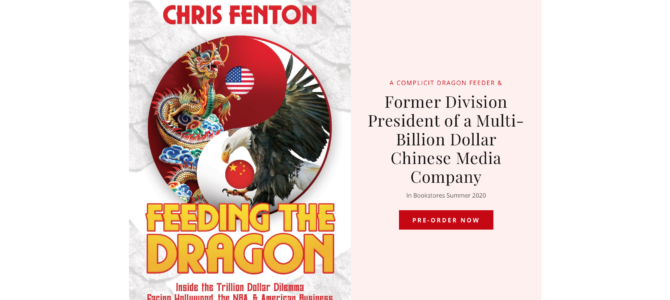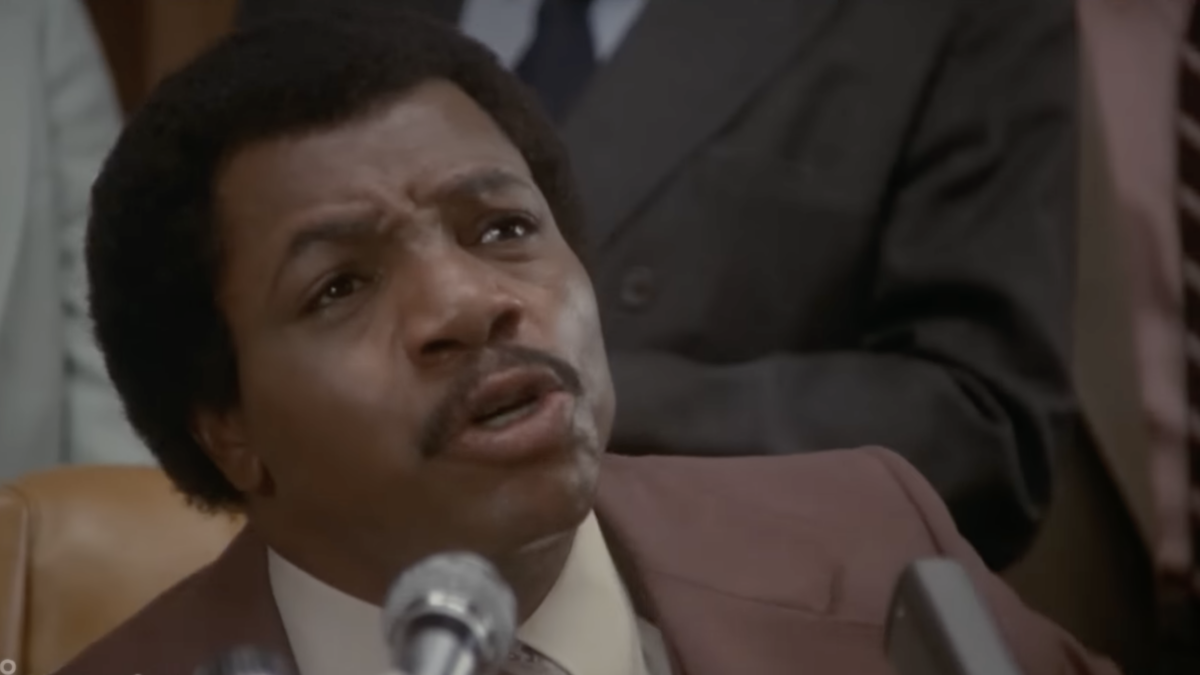
Chris Fenton spent years on the front lines of Hollywood’s controversial relationship with China, working to distribute major American films in the Middle Kingdom. Now, as tensions between the two countries heat up, Fenton wants to tell his story. Few in the industry have been willing to do the same, making his project a rare break in the silence.
The film executive, a producer on movies such as “Blockers” and “47 Ronin,” is set to release his first book in July, titled, “Feeding the Dragon: Inside the Trillion Dollar Dilemma Facing Hollywood, the NBA, & American Business.” After pre-sales opened up last week, the book received an Instagram endorsement from none other than Jerry O’Connell, a longtime friend of Fenton. It’s a timely project, to be sure.
Back in December, Fenton, the former president of DMG Entertainment and general manager of DMG North America, a multibillion-dollar Chinese media company, dished on script censorship, telling me there was “definitely a conversation behind closed doors” about concerns over China in the film industry. “Hollywood would like to keep it that way too,” Fenton said at the time. That may no longer be possible.
With coronavirus decimating Chinese box offices, and relations between the U.S. and China at the forefront of American politics, I checked back in with Fenton for a preview of the insights “Feeding the Dragon” will bring to the broader conversation.
Emily Jashinsky: Why should Americans be concerned about the cultural and financial entanglements between Hollywood and China you outline in this book?
CF: If the stewards of Hollywood entities are only beholden to quarterly earnings and shareholder pressure in the short term, we will find ourselves selling our souls as Americans to make a quick buck in China. And I’m not saying such stewards are bad people, because I’m not bad myself. That said, the fog of war blinds us to poor decisions we make in real time when we convince ourselves it’s the right thing to do because it generates great short-term business.
However, if we have stewards like Kevin Feige of Marvel, then we have nothing to worry about. Why? Because I worked closely with him on “Iron Man 3.” Every time I suggested implementing something of Chinese relevance into that film, Kevin would first ask, “Will that damage the Marvel brand that took decades to build? Will it taint the enthusiasm our fans have for Marvel and of those very fans that made Marvel what it is today? And will my idea make the movie better?”
Kevin never asked, “Well, if we do that, how much more money will we make?” At the time, I hated his stubborn and protective behavior of all things Marvel. However, now I greatly admire it. It also challenged me and our team to come up with more innovative ideas to help our cause in China while allowing Kevin to protect the interests of Marvel.
EJ: Do you expect Hollywood’s financial relationship with China to get even tighter in future years?
CF: Yes. The biggest market in the world will provide the greatest revenue potential in the world.
EJ: This seems like a potential area for bipartisan cooperation. Do you anticipate lawmakers in the U.S. applying any pressure to the film industry in order to deal with its relationship with China?
CF: Yes, and I continue to see “Mulan” as a great catalyst for such. Hollywood’s pandering to China is still at the front of everyone’s minds thanks in large part to the recent NBA controversy. I do think Congress is going to get more engaged on the issue, dragging the public into it more as a result. “Mulan” represents on the macro what many would consider a very hardcore pandering action by Disney. China stars, China locations, China story, etc. Whether it is or not, I’m not to say (and I’d also disagree too). However, symbolically, it looks like a massive Disney kissing-the-ring-of-China play.
EJ: In the next year, how will we see this relationship tested? How could coronavirus impact the exchange?
CF: Moving forward with our new “wokeness,” we must continue prioritizing further bilateral collaboration. But we must do so without resorting to activities which marginalize the principles, ethics, interests, and beliefs of Americans. And we need to talk openly about this. No longer can we keep the conversation, as what Brooklyn Net’s owner Joseph Tsai describes as a “third rail issue,” behind closed doors. And through open dialogue, we will devise a more strategic, innovative, and intelligent implementation of China’s often strong-armed requests, doing so without selling our souls as Americans.
There’s a real opportunity with the coronavirus for the U.S. and American companies to gain favor from China. Rather than running from them during their time of need, we should head towards the gunfire and offer real help. The Chinese have great memories. They remember who was a friend during tough times, but even more so, they remember those who weren’t. Playing such a high-stakes opportunity strategically could benefit the U.S. with bilateral challenges for many years to come.
EJ: Is any backlash against China mounting in the entertainment industry?
CF: Behind closed doors, there is a sense that dealing with China has been and always will be a pain in the -ss, yet an extremely necessary evil. I’d argue that filmmaking in general isn’t all that easy either, nor is dealing with prima donna artists, so is adding China to the mix really making the process unbearable? And even if it is, think of the next generations of Americans. Cultural and commercial exchange seems to be the only thread holding our countries together, so let’s get smart and continue to implement it. If we don’t, can we all truly live with a next generation version of a Cold War? I don’t think so.
EJ: How much control over films backed by American companies and marketed to American audiences does the Chinese government really have? What does that look like?
CF: Put it this way, China will be the largest film market in the world next year, after which it will always be the largest film market. Any studio wanting access to such a crucial market for generations to come will never purposely anger China. And, more commonly, studios will be very motivated to please China, if bottom-line revenues are the biggest drivers in decision making. That’s why having creatives like Kevin Feige leading studios or possibly having peer groups or outside regulators mitigating such behavior will be key.
EJ: How is China using the U.S.’s playbook from 1790, as you argue in “Feeding the Dragon”?
CF: The U.S. also used tariffs and other protectionist policies to give U.S. industries the ability to catch up to their European counterparts. In fact, it was the great Alexander Hamilton who labeled these as “infant industries.” To help these companies grow and flourish, Hamilton constructed many protectionist trade policies, beginning with tariff acts passed through Congress as early as 1789.
EJ: What motivated you to write the book?
CF: For one, I felt a sense of duty. I have two kids who are going to grow up and grow old in a world dominated by the two superpowers. The U.S. and China have a massively complicated relationship, but I figured if I could simplify it in my own head, then why not try to for others.
Secondly, I was inspired by several influential moments. One was Election Day 2016, watching the annual Pac-12 basketball games in Shanghai, and then meeting at Nike’s magnificent China campus. The anti-China rancor of the U.S. election period made it seem both countries had absolutely nothing in common.
However, on that particular day, watching some of our best amateur athletes play some of theirs in friendly competitions, in front of extremely appreciative crowds, and then seeing firsthand the amazing cross pollination of culture and commerce Nike had been applying in that market — some of which I had been a part of years earlier as you’ll read in the book … well, in a nutshell, everything felt hopeful in a bilateral sense that day. In fact, that optimistic feeling was only reinforced the next day when we took the athletes to Disney’s Shanghai park. We were blown away by the enthusiasm the Chinese crowds had for Disney — perhaps the most iconic American company and cultural brand.
I thought to myself, “There are so many things we simply don’t see eye-to-eye on bilaterally, but when it comes to culture and the commerce of culture … well, there’s some real common ground and a passionate desire for collaboration.” I then did some research on the ping-pong diplomacy days of 1971 and ran ideas by some journalist friends, and next thing you know, I was determined to write a story about it.









